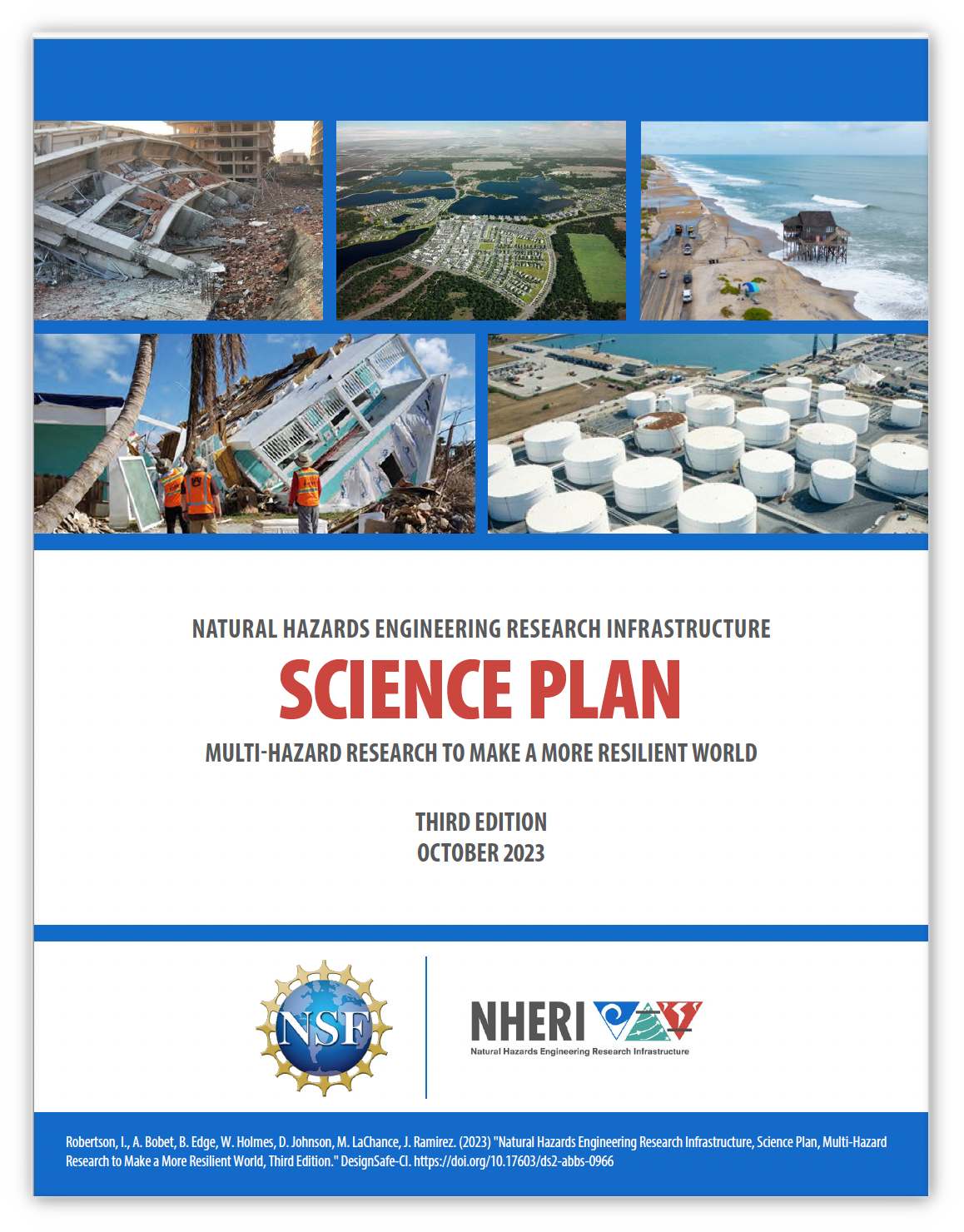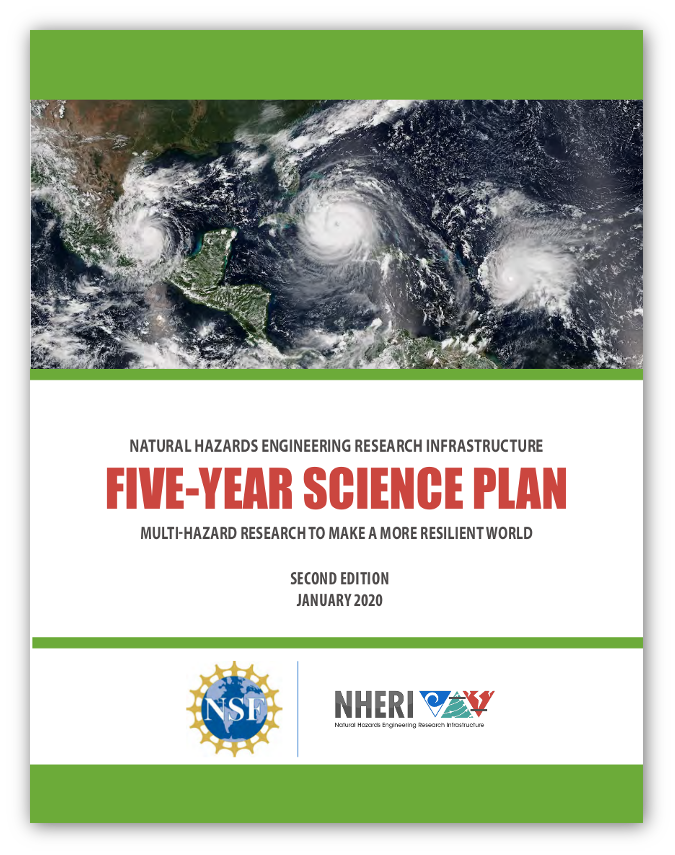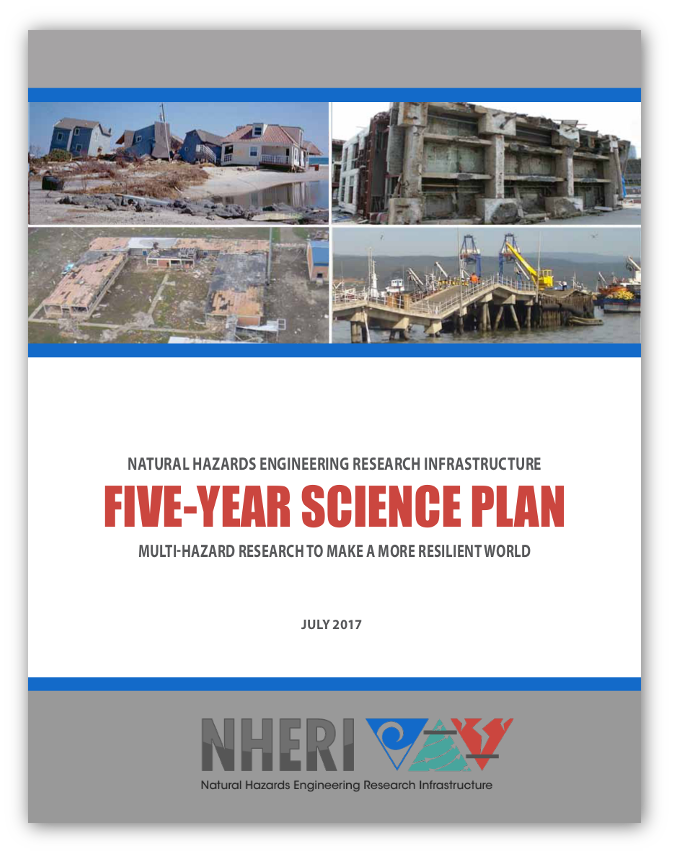NHERI Network Coordination Office
NHERI Science Plan
A fundamental responsibility of the NHERI NCO is to oversee the development of a formal Science Plan. The NHERI Science Plan functions as a roadmap for future natural hazards research, ensuring researchers in related disciplines work together to achieve our common goal: keeping the nation’s civil infrastructure, and its human inhabitants, safe.
NHERI Science Plan, Third Edition, October 2023.
Robertson, I., A. Bobet, B. Edge, W. Holmes, D. Johnson, M. LaChance, J. Ramirez. (2023) "Natural Hazards Engineering Research Infrastructure, Science Plan, Multi-Hazard Research to Make a More Resilient World, Third Edition." DesignSafe-CI.
https://doi.org/10.17603/ds2-abbs-0966.
The Science Plan provides the Grand Challenges and Key Research Questions for natural hazards researchers, funding agencies, practitioners, students and the public on the research needs for advancing hazards engineering practice and community resilience. These include many sample research approaches, and tips for research proposals, which are especially useful to early career researchers.
Among many significant updates, the third edition incorporates NHERI SimCenter software tools, interdisciplinary and social science perspectives of the CONVERGE facility — as well as details about the extreme events research (EER) networks, coordinated by CONVERGE.
Updates in the third edition were informed by multiple meetings of the Science Plan Task Group. In addition, the document incorporates community input received at multiple meetings and workshops, from DesignSafe users, and NHERI Summer Institute attendees.
Science Plan Videos
DesignSafe Early Career Workshop: Using the NHERI Science Plan to Build a Research Agenda (April 19, 2024)
In this in-depth workshop, author Ian Robertson hosts early-career researchers to discuss specific ways they can leverage the Science Plan when forming research questions and writing NSF proposals.
Intro to the Science Plan 3rd Edition for the NHERI Graduate Student Council (Jan 19, 2024)
Lead author Ian Roberts provides an overview of the Science Plan for early-career researchers.
NHERI CONVERGE presents: Social Science Research and the NHERI Science Plan (March 21, 2024)
For social scientists and disaster researchers, presenter Ian Roberts elucidates the interdisciplinary aspects of the Science Plan.
NHERI Science Plan: Moving Civil Engineering Research into Practice (Nov 15, 2023)
Lead author Ian Robertson on ways the Science Plan can facilitate technology transfer.
Introducing the NHERI Science Plan, Third Edition (Nov 7, 2023)
Concise, seven-minute overview of the Science Plan, with lead author Ian Robertson.
Previous Editions
NHERI is committed to evolving the Science Plan with feedback from the natural hazards research community and guidance updates from funding organizations like the National Science Foundation. Previous editions of the Science Plan are available here, for reference:
Third Edition Task Group
The following members of the Science Plan Task Group guided the development of the 3rd edition of the five-year NHERI Science Plan:
- Rachel Adams, Ph.D., M.P.H, Research Associate, Natural Hazards Center, University of Colorado Boulder
- Ross W. Boulanger, Ph.D., P.E., N.A.E., Professor, Department of Civil and Environmental Engineering, University of California, Davis
- Ann-Margaret Esnard, Ph.D., Associate Dean, Andrew Young School of Policy Studies, Georgia State University
- Andrew Kennedy, Ph.D., Professor, Department of Civil and Environmental Engineering and Earth Sciences, University of Notre Dame
- Tracy Kijewski-Correa, Ph.D., Professor, Department of Civil and Environmental Engineering and Earth Sciences and Keough School of Global Affairs, University of Notre Dame
- Bret Lizundia, S.E., Principal, Rutherford + Chekene Consulting Engineers
- Laura Lowes, Ph.D., Professor, Department of Civil and Environmental Engineering, University of Washington
- Lelio H. Mejia, Ph.D., P.E., G.E., N.A.E., Senior Principal, Geosyntec Consultants
- David Mendonca, Ph.D., Senior Principal Decision Scientist, MITRE Corporation
- Eduardo Miranda, Ph.D., Professor, Department of Civil and Environmental Engineering, Stanford University
- Maryam Asghari Mooneghi, Ph.D., P.E., Senior Structural Engineer, AECOM
- Stephanie Patch, Ph.D., P.E., Associate Professor, Department of Civil, Coastal, and Environmental Engineering, University of South Alabama
- Lori Peek, Ph.D., Professor, Department of Sociology, University of Colorado Boulder
- David O. Prevatt, Ph.D., Professor, Department of Civil and Coastal Engineering, University of Florida
- Dorothy A. Reed, Ph.D., P.E., Professor, Civil and Environmental Engineering, University of Washington
- Jennifer Tobin, Ph.D., Deputy Administrator, Natural Hazards Center, University of Colorado Boulder
- Gabrielle Wong-Parodi, Ph.D., Assistant Professor, Department of Earth Systems Science, Stanford University
The Task Group was supported by the following Network Coordination Office (NCO) staff:
- Antonio Bobet, Ph.D., Edgar B. and Hedwig M. Olson Professor in Civil Engineering, Purdue University
- Billy L. Edge, P.E., Ph.D., Dist.M. ASCE, Professor of Practice, Civil, Construction, and Environmental Engineering Department, North Carolina State University
- William T. Holmes, S.E., N.A.E., Senior Consultant, Rutherford + Chekene Consulting Engineers
- Julio Ramirez, Ph.D., Karl H. Kettelhut Professor of Civil Engineering, Purdue University
- Ian Robertson, Ph.D., Arthur N.L. Chiu Distinguished Professor of Civil and Environmental Engineering, University of Hawaii at M?noa
- Thomas L. Smith, AIA, RRC, F.SEI, TLSmith Consulting Inc.








